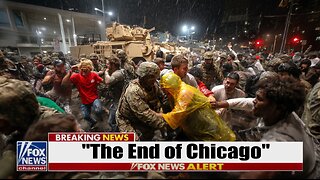Premium Only Content

The truth behind the MMR vaccine controversy: Dr. Andrew Wakefield’s stand against medical orthodoxy
In a riveting exchange with Michael Knowles, Dr. Andrew Wakefield, the embattled physician at the center of the MMR vaccine controversy, laid bare the tactics used to silence dissent in public health. Wakefield’s career was destroyed, his reputation smeared, and his research discredited—not because of fraud, but because he dared to ask questions that challenged the prevailing narrative.
Knowles highlighted the erosion of trust in public health, pointing to the shifting claims about the COVID vaccine: first deemed “totally safe” and “effective,” then admitted to be neither fully protective nor preventive of transmission. “There’s a major credibility issue for public health experts,” Knowles noted, drawing parallels to Wakefield’s ordeal.
Wakefield recounted how he and other clinicians faced ruin for questioning the MMR vaccine’s safety. “Outstanding academics were bankrupted, stripped of licenses, and trashed for taking a moral stand,” he said. Accused of fraud and misconduct, Wakefield faced a media onslaught orchestrated by those with “limitless resources.” The allegations? That he hid conflicts of interest and fabricated data to undermine the MMR vaccine for personal gain.
But Wakefield dismantles these claims with precision. He openly informed his medical school, his manager, and The Lancet’s editor, Richard Horton, about his work with lawyers to investigate a potential vaccine-autism link—a common practice in medical litigation. “There was no cover-up,” he insisted. “It was totally transparent.” Yet, the media painted him as a conspiracist, alleging he sought to patent a rival vaccine. “They accused me of unethical behavior, but this was standard practice,” he said.
The retraction of his 1998 Lancet paper? A sham. Wakefield and two colleagues refused to sign it, as it demanded retracting a claim they never made: that MMR directly causes autism. “How can you retract something that doesn’t exist?” he asked. Nine co-authors, under pressure, caved to political forces, but the retraction was of an interpretation, not the study’s data on bowel disease or developmental regression.
Wakefield’s story is a chilling reminder of what happens when power suppresses truth. “Justice belongs to those who can afford it,” he said, reflecting on the “lawfare” that bankrupted dissenters. His fight wasn’t about fame or fortune—it was about pursuing a hypothesis to protect children. Yet, the establishment ensured he became a cautionary tale to silence others.
This is bigger than one man. It’s about a system that punishes questions and rewards compliance. Will we let truth be the next casualty?
-
 35:45
35:45
Stephen Gardner
15 hours ago🔴BREAKING: Election Auditor EXPOSES Democrat Election Fraud Evidence!
44.1K61 -
 15:48
15:48
Sponsored By Jesus Podcast
19 hours agoHow to Stop Being JEALOUS | When Comparison Steals Your Joy
15.7K12 -
 3:56:59
3:56:59
DLDAfterDark
9 hours ago $15.86 earnedDon't Worry - Things Will Get SO Much Worse! Sometimes It Be Like That
32K9 -
 25:41
25:41
Robbi On The Record
15 hours ago $4.37 earnedThe Billion-Dollar Lie Behind OnlyFans “Empowerment” (Her Testimony Will Shock You) | part II
20.7K13 -
 12:22
12:22
Cash Jordan
7 hours ago"CHICAGO MOB" Fights Back... "ZERO MERCY" Marines DEFY Judge, SMASH ILLEGALS
39.6K51 -
 46:58
46:58
Brad Owen Poker
19 hours agoI Make QUAD ACES!!! BIGGEST Bounty Of My Life! Turning $0 Into $10,000+! Must See! Poker Vlog Ep 323
24.2K7 -
 2:52:28
2:52:28
TimcastIRL
10 hours agoSTATE OF EMERGENCY Declared Over Food Stamp CRISIS, Judge Says Trump MUST FUND SNAP | Timcast IRL
261K152 -
 3:22:45
3:22:45
Tundra Tactical
17 hours ago $21.59 earned🚨Gun News and Game Night🚨 ATF Form 1 Changes, BRN-180 Gen 3 Issues??, and Battlefield 6 Tonight!
50.1K6 -
 1:45:13
1:45:13
Glenn Greenwald
13 hours agoJD Vance Confronted at Turning Point about Israel and Massie; Stephen Miller’s Wife Screams “Racist” and Threatens Cenk Uygur with Deportation; Rio's Police Massacre: 120 Dead | SYSTEM UPDATE #540
124K174 -
 9:05:24
9:05:24
SpartakusLIVE
10 hours agoSpart Flintstone brings PREHISTORIC DOMINION to REDSEC
42.9K11